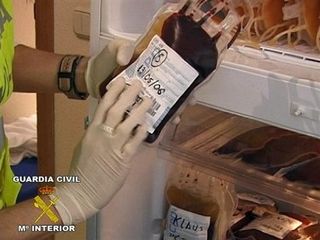Walsh hits out at UCI over passport
Author thinks sophisticated cheats are still ahead

David Walsh, one of the sport's leading anti-doping fighters and chief sports writer for the Sunday Times has hit out at the UCI and the biological passport programme, saying that cycling's governing body is still some way short from catching the leading cheats.
Walsh, author of, From Lance to Landis and LA Confidentiel told Cyclingnews, "The passport seemed like a good idea but I don't believe that the system can catch the sophisticated cheater. The evidence we have so far is that the guys towards the winning end of the classification in big races are still significantly ahead of the UCI's checks."
Asked for evidence to back up these claims, Walsh pointed to Antoine Vayer, a former coach from the Festina team, who now analyses data from the Grand Tour's major climbs and rider's power outputs.
"I look at the times and Vayer's take on it. He looked at this year's race: the speed, the speed on the climbs and he said ‘sorry, this sport has not seriously changed'. I'm sure it has changed to a degree but if it hasn't changed at the very top then it hasn't changed in the way we wanted it to."
The biological passport, which is a record of every rider's blood profile, is paid for by the sport's professional teams at a cost € 5.3 million in 2008. The UCI spent over a year collecting data by testing riders in order to build up long-term profiles.
The data is analysed by independent experts. It has already led to several doping cases being opened, with former Giro d'Italia winner Danilo Di Luca the highest profile case.
The Italian's career now looks to be in tatters, but according to Walsh, cycling's purification lies with the sport's governance and not just the actions and behaviour of the riders.
Get The Leadout Newsletter
The latest race content, interviews, features, reviews and expert buying guides, direct to your inbox!
Attacking a lack of consistency by the UCI, Walsh pinpointed the body's president, Pat McQuaid, who had previously ruled out retesting of last year's drug test from the Giro.
"In the wake of the revelations that riders had used CERA in last year's Tour de France the UCI were invited to go back and look the test results from the Giro."
Ricardo Ricco finished second overall to Alberto Contador at the Giro d'Italia last year and then two months later tested positive for CERA at the Tour de France. The UCI president Pat McQuaid refused to perform retroactive testing on the Giro samples last year, but just last week changed his mind and is trying to obtain the samples to have the tests done.
"The UCI president refused retrospective testing. He said it was a bad idea. How can he have one view and then a few months later completely change? There's obviously some pressure and it's politically wise to retest those samples now. It shows that at that top level it's a game of politics and not a game of integrity." Walsh added.
With Alexandre Vinokourov set to make his return to racing after serving a two year ban for blood doping, Walsh refused to comment on whether the rider's comeback was a blow for cycling. "I reserve my disgust for the people who should be policing the sport. The Vinokourov's are just the pawns who do things, come back and don't change their mindsets."
Walsh, who is currently investigating the drug culture within rugby union after three Bath players refused drug tests, believes that proper policing would act as a key deterrent.
"We've seen all of this before, but the UCI should be the ones saying to the riders ‘you're not going to get away with it. We're on your case. If we get evidence that you've used a drug we couldn't test for last year we will go back and retest those samples.' "
This year, the Tour de Franc has so far passed with just one positive doping test (Mikel Astarloza, EPO), but Walsh pointed to winner Alberto Contador as an example of a how the sport had missed a chance to portray a cleaner image.
Contador has never tested positive; however he was initially implicated in the Operacion Puerto scandal that hit the sport in 2006. He was suspected of being the rider whose blood bags were labeled 'AC', but was later cleared.
"We want a winner we can believe in. Everyone wants that. If we had Alberto Contador's involvement in Puerto properly thrashed out and found out precisely who AC was and what he was doing I'd be a lot happier."
"I've always been unhappy when thing's aren't dealt with and his alleged involvement has never been dealt with. When he's asked a question at the Tour about his VO2 Max and doesn't answer, I just think, why? Why would you refuse to answer a question like that? It's something that a lot of cycling fans would like to know."
Daniel Benson was the Editor in Chief at Cyclingnews.com between 2008 and 2022. Based in the UK, he joined the Cyclingnews team in 2008 as the site's first UK-based Managing Editor. In that time, he reported on over a dozen editions of the Tour de France, several World Championships, the Tour Down Under, Spring Classics, and the London 2012 Olympic Games. With the help of the excellent editorial team, he ran the coverage on Cyclingnews and has interviewed leading figures in the sport including UCI Presidents and Tour de France winners.
Most Popular


